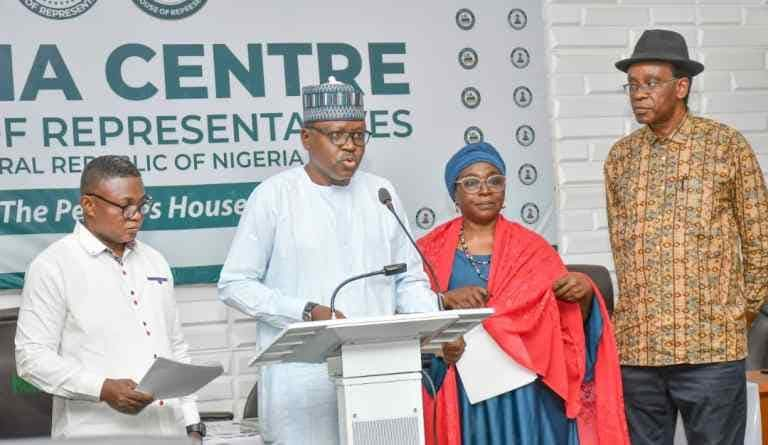
CSOs Urge President Tinubu, National Assembly to Halt Oil Divestment in Niger Delta
Comfort Chukwukelue/ Abuja
Abuja, Nigeria — A coalition of Civil Society Organizations (CSOs) has called on President Bola Ahmed Tinubu and the National Assembly to immediately halt ongoing divestment of oil assets by international oil companies (IOCs) operating in the Niger Delta. The group’s demand was outlined in petitions sent to President Tinubu on December 16, 2024, and Speaker of the House of Representatives, Hon. Tajudeen Abbas, on December 18, 2024.
At a press briefing held in Abuja, Isaac Botti, Programmes Coordinator of Social Action Nigeria, and Reverend Nnimmo Bassey, Founder of the Health of Mother Earth Foundation (HOMEF), expressed deep concerns about the environmental, social, and economic impacts of divestment on the Niger Delta region. They warned that these actions could exacerbate environmental degradation and health crises, leaving affected communities burdened with unresolved liabilities.
Key Concerns Highlighted by CSOs
- Environmental Damage
The Niger Delta has suffered decades of environmental degradation due to oil exploration. The CSOs outlined severe consequences, including:
Water Pollution: Rivers and groundwater contaminated with hydrocarbons, rendering them unsafe for consumption.
Soil Infertility: Farmland devastated by continuous oil spills, worsening food insecurity.
Biodiversity Loss: Marine ecosystems destroyed, impacting livelihoods and cultural heritage.
The CSOs referenced reports by the United Nations Environment Programme (UNEP), which found benzene levels 900 times above safe limits in Ogoniland and chromium levels 1,000 times higher than World Health Organization standards in Bayelsa. Cleanup costs are estimated at $100 billion for the entire Niger Delta.
- Health Crises
Communities face severe health challenges linked to pollution, including respiratory diseases, cancer, and skin conditions. A report by the Bayelsa State Oil and Environment Commission highlighted the widespread infiltration of harmful substances into the region’s air, soil, and water. - Unresolved Liabilities from Past Divestments
The CSOs cited examples of previous asset sales by IOCs that left environmental damage unaddressed:
Shell’s divestment to Aiteo: Pollution in Nembe remains unresolved.
ExxonMobil’s divestment: Insufficient remediation efforts by new operators.
ENI/AGIP’s sale to Oando: Persistent environmental issues.
CSOs’ Demands
The coalition called for the following actions:
Immediate suspension of all IOC divestments until environmental liabilities are addressed.
Transparent consultations with host communities and state governments.
Establishment of an Environmental Restoration Fund, funded by IOCs, to ensure comprehensive cleanup.
Mandatory profit-sharing for host communities.
Independent vetting of new operators to ensure adherence to environmental and social responsibilities.
The CSOs emphasized that failure to address these issues could lead to unrest and undermine Nigeria’s national interests.
A Call for Accountability
The coalition urged President Tinubu to prioritize the welfare of the Niger Delta’s communities over the financial interests of multinational corporations. They warned that approving Shell’s sale of its remaining shares in Shell Petroleum Development Company (SPDC) to the Renaissance consortium without addressing liabilities would set a dangerous precedent.
“Approving Shell’s divestment in its current form would send a message that corporations can extract resources, leave devastation behind, and walk away without accountability,” the statement read.
Signatories
The petition was signed by representatives from over 40 civil society organizations, including Social Action Nigeria, Amnesty International, Corporate Accountability and Public Participation Africa (CAPPA), Environmental Rights Action/Friends of the Earth Nigeria, and the Africa Network for Environment and Economic Justice (ANEEJ).
Conclusion
The CSOs urged the National Assembly to hold IOCs accountable and ensure divestments align with Nigeria’s environmental and economic interests. “This is a critical moment for Nigeria,” the statement concluded. “We must safeguard the future of the Niger Delta and the nation at large.”



